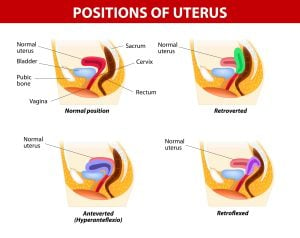Retroverted uterus: have you ever heard of this condition? For many women with a retroverted uterus, the ultrasound conducted as a normal part of pre-natal care is the first they become aware of it. It usually has no impact on your ability to conceive. You can expect a retroverted uterus pregnancy to proceed normally, just like any other.
There are exceptions, when the retroverted uterus is caused by another underlying cause and even in the absence of any underlying cause, some women experience minor symptoms. In this article we will explain these exceptions and symptoms, and everything else you need to know about a retroverted uterus.
What is a retroverted uterus?
A retroverted uterus curves backwards from the cervix towards the rectum, rather than tipping forwards towards the navel. It is also known as a tipped, retroflexed, or backward uterus. Your genetic inheritance is most often the cause of a retroverted uterus.
Where it isn’t, and has been acquired later in life, underlying causes can include:
- Endometriosis, in which endometrial tissue can effectively ‘glue’ the uterus into a backward position.
- Uterine fibroids can make the uterus misshapen or stuck in a backwards tilt.
- Pelvic inflammatory disease (PID) can cause scarring if left untreated, with effects similar to endometriosis.
Check here the different positions that an uterus can have:

What are the symptoms of a retroverted uterus?
There are often no symptoms at all but when they do occur, symptoms can include:
- Lower back pain or vaginal pain during sex;
- Painful periods or trouble inserting a tampon;
- A feeling of pressure on the bladder, sometimes with increased frequency of urination;
- Slight incontinence;
- A protruding lower abdomen.
If you have any of these symptoms, you should see your doctor. A routine pelvic examination would diagnose the condition. If you don’t have any symptoms, you will probably remain unaware of it until you become pregnant and have an ultrasound examination.
How is a retroverted uterus treated?
If you do have symptoms, possible treatments range from exercises such as pelvic floor exercises you can do at home, to surgical intervention. In this case, surgery can be used to reposition the uterus and reduce or eliminate pain. Surgery can consist of:
- A uterine suspension procedure. It can be carried out laparoscopically, abdominally or via the vagina.
- An uplift procedure, a brief 10-minute process which is done laparoscopically.
If you have no symptoms, there is no need for any treatment. The condition will not do you any harm.
Will a retroverted uterus affect my fertility?
On its own, a retroverted uterus will not affect your fertility. You will be able to conceive as easily as anyone else. The only exceptions when it could indirectly affect your fertility are when it is associated with another condition. Among them, endometriosis, uterine fibroids and PID may be the cause of a retroverted uterus, not the other way around.
Endometriosis and fertility
Troubles like endometriosis can affect your fertility by reducing the ovarian reserve, the oocyte quality or by causing a blockage of the fallopian tubes. This is not always the case, but if your fertility is affected in one of these ways, there are options available to help. Your fertility doctor may suggest freezing your eggs in the case of a diminishing ovarian reserve. If you are ovulating normally but have blocked fallopian tubes, in vitro fertilisation (IVF) would be the obvious choice of treatment. This is because in IVF, eggs are retrieved directly from the ovaries, bypassing the fallopian tubes completely.
Uterine fibroids and infertility
Uterine fibroids do not usually interfere with conception or a successful pregnancy but. However, in some cases, fertility can be affected because the fibroids can bulge into the uterine cavity. If this affects you, you should discuss with your doctor the best options for protecting your fertility.
PID and fertility
Untreated pelvic inflammatory disease, which is usually the result of a sexually transmitted infection, can cause infertility in the same way as endometriosis. It causes scarring and ultimately a blockage of the fallopian tubes. In this case and for the same reasons, IVF would probably be the recommended treatment.
Retroverted uterus and pregnancy
A retroverted uterus does not usually have any adverse effect on the viability of your pregnancy. However, on occasion some issues can arise.
Additional pressure on your bladder during the first trimester can cause difficulty urinating, mild incontinence or back pain.
After the first trimester, as your uterus expands and straightens, it should lift out of the pelvis and lose its backward tilt.
Can you carry a baby with a retroverted uterus?
Very occasionally, the uterus is unable to lift in this way because it is permanently anchored in the pelvis by adhesions. This could increase the risk of miscarriage but as long as it is spotted early enough, it can be treated successfully.
Can a retroverted uterus hide pregnancy on ultrasound?
During the first trimester, it may be more difficult for the midwife or doctor to see an image of your uterus during routine checks. It may be necessary to have a transvaginal rather than external ultrasound during this period.
How rare is retroverted uterus?
This condition is not unusual, and it’s not defined as an abnormality. Medically, it is described as a standard variation of pelvic anatomy. Many women are born with a retroverted uterus, or it can be acquired in maturity. Estimates of its occurrence vary between 20% and 25%. One in four or five women have a retroverted uterus, though it’s likely that many of them do not know it.
Contact IVI for any fertility issues
We hope you feel reassured that, if you are one of the 20–25% of women with a retroverted uterus, your fertility and eventual successful pregnancy are not likely to be compromised. But if you do have any lingering concerns, or you are one of the few for whom the condition does seem to be causing problems, do get in touch with us at IVI. As the largest assisted reproduction group in the world, we can bring our wealth of experience and expertise to finding solutions, and we can almost certainly help. Contact our international team if you want to book an appointment to start analysing your case.





Comments are closed here.